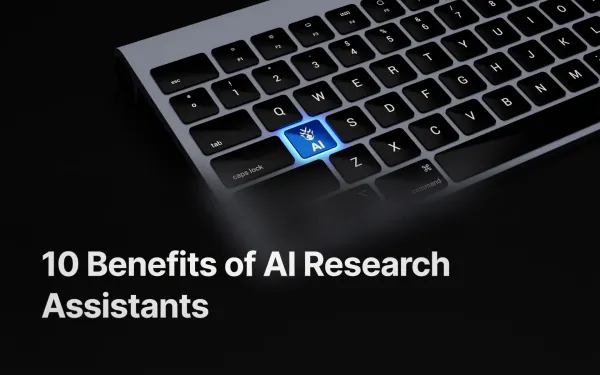15 AI Tools for Literature Review
Discover 15 AI tools to streamline your literature review process, from reference management to advanced paper discovery and writing assistance.

Ever found yourself overwhelmed by the sheer volume of research papers and data while trying to conduct a literature review? With the growing complexity of academic research, managing and synthesizing information can be a daunting task.
How can you streamline this process and ensure that you’re not missing out on key insights? Enter AI tools for literature review. These innovative technologies are designed to simplify and enhance your research experience.
In this blog, we’ll explore 15 powerful AI tools that can help you efficiently find, analyze, and manage academic literature, making your literature review process smoother and more effective. Ready to transform the way you handle research? Let’s dive in!
Definition of AI Tools for Literature Review
AI tools for literature review are advanced software applications that use artificial intelligence to assist researchers in managing, analyzing, and synthesizing academic literature. These tools help streamline various aspects of the literature review process, including:
- Searching and Discovery: AI tools enhance search capabilities to find relevant research papers and studies more effectively, often providing recommendations based on the user’s research interests.
- Summarization and Analysis: They automate the summarization of research papers and analyze data to highlight key findings, trends, and connections within the literature.
- Reference Management: AI tools assist in organizing and managing citations, ensuring accurate and consistent referencing throughout the research.
- Visualization and Mapping: Some tools create visual maps of research connections and trends, helping researchers understand relationships between different studies.
- Collaboration: They facilitate team collaboration by offering shared workspaces and tools for real-time editing and communication.
Overall, AI tools for literature review make the research process more efficient and insightful by leveraging advanced technologies to handle repetitive tasks, enhance data analysis, and support effective research management.
1. V0 Report

V0 Report is an AI-powered tool designed to generate comprehensive and insightful reports on academic literature. It simplifies the process of synthesizing research findings and provides detailed analyses that help researchers understand and present their literature review effectively.
Features:
- Automated Summarization: Quickly condenses research papers into concise summaries, highlighting key findings and contributions.
- Detailed Analysis: Offers in-depth analysis and synthesis of research topics, trends, and methodologies.
- Customizable Reports: Provides various templates and formats for generating reports tailored to specific needs.
- Database Integration: Connects with major academic databases to pull relevant research papers and data.
2. Researchrabbit

Researchrabbit helps researchers discover and track academic papers and trends in their fields. It visualizes the relationships between papers and provides real-time updates on new publications.
Features:
- Visualization: Maps out connections between research papers to reveal trends and influential studies.
- Real-Time Updates: Keeps users informed about the latest publications and developments in their research area.
- Customizable Filters: Allows users to set specific criteria for searches and updates.
- Collaboration Tools: Facilitates sharing and collaboration with research teams through shared bibliographies and notes.
3. Semantic Scholar

Semantic Scholar is an AI-enhanced academic search engine that provides relevant and comprehensive research results by leveraging advanced algorithms and citation analysis.
Features:
- Advanced Search: Uses machine learning to improve search accuracy and relevance.
- Citation Graphs: Shows how papers are cited and their influence in the academic community.
- Summarized Insights: Provides brief summaries of papers, including key findings and contributions.
- Recommendation System: Suggests papers based on user’s research interests and search history.
4. SciSpace
SciSpace integrates tools for literature review, writing, and collaboration into a single platform, making it easier for researchers to manage their projects and work together.
Features:
- Collaborative Writing: Enables real-time collaboration on research papers with co-authors.
- Reference Management: Includes tools for managing citations and references directly within the platform.
- Citation Styles: Supports various citation styles and automatic formatting.
- Project Management: Offers features for tracking progress and organizing research tasks.
5. Litmaps

Litmaps provides an interactive and dynamic way to visualize academic literature. It helps researchers explore relationships between papers and track the evolution of research topics.
Features:
- Dynamic Literature Mapping: Visualizes research papers and their connections in an interactive map.
- Trend Discovery: Identifies emerging trends and influential studies in the field.
- Real-Time Alerts: Notifies users of new publications and updates related to their research interests.
- Customizable Maps: Allows users to customize their literature maps based on specific topics or research areas.
6. ChatGPT

ChatGPT is an AI language model that assists with summarizing, analyzing, and generating insights from academic literature. It helps researchers draft and refine their papers and answer specific research questions.
Features:
- Natural Language Processing: Uses advanced NLP to summarize and interpret research papers.
- Contextual Understanding: Provides relevant answers and insights based on the context of the literature.
- Drafting Assistance: Helps generate and edit text for research papers and literature reviews.
- Interactive Q&A: Allows users to ask specific questions and receive detailed responses based on the literature.
7. Elicit

Elicit is designed to streamline evidence gathering and analysis for literature reviews. It helps researchers systematically collect and organize data from academic papers.
Features:
- Structured Evidence Extraction: Facilitates the extraction of relevant information and data from research papers.
- Data Organization: Organizes extracted data into structured formats for easy analysis.
- Customizable Workflows: Supports customizable research workflows tailored to specific review needs.
- Collaboration Features: Enables team collaboration with shared workspaces and project tracking.
8. Connected papers

Connected Papers offers a graph-based interface for exploring and understanding academic papers and their connections. It helps researchers discover influential papers and related research topics.
Features:
- Graph Visualization: Visualizes relationships between papers and how they cite each other.
- Influence Tracking: Highlights influential papers and key studies in the research area.
- Interactive Exploration: Allows users to explore related research topics and papers interactively.
- Integration: Connects with academic databases for comprehensive literature exploration.
9. ChatPDF

ChatPDF is an AI tool for interacting with and extracting information from PDF documents. It facilitates detailed analysis and information retrieval from research papers.
Features:
- Text Extraction: Extracts text and data from PDF documents for easy analysis.
- Question Answering: Allows users to ask questions about the content of PDFs and receive precise answers.
- Annotation Tools: Supports highlighting and annotating text within PDF documents.
- Search Functionality: Provides search capabilities within PDF documents to locate specific information quickly.
10. Inciteful

Inciteful provides insights into academic research trends and citation patterns, helping researchers understand the impact and influence of studies.
Features:
- Citation Analysis: Analyzes citation patterns to determine the impact of research papers.
- Trend Identification: Identifies trends and emerging topics in the research field.
- Influence Metrics: Provides metrics on paper influence and researcher impact.
- Interactive Dashboards: Features dashboards for visualizing citation data and trends.
11. Scholarcy

Scholarcy uses AI to summarize and highlight key points in academic papers, making it easier for researchers to understand and review large volumes of literature.
Features:
- Automated Summarization: Generates concise summaries of research papers, highlighting key findings and contributions.
- Flashcards: Creates flashcards for quick review of important concepts and facts.
- Key Points Extraction: Extracts and highlights significant points from papers.
- Integration: Integrates with various academic databases and reference managers.
12. Scite

Scite helps researchers understand how academic papers have been cited by others, providing insights into the influence and context of the research.
Features:
- Citation Context: Shows how papers have been cited, including supportive, contrasting, and mention-only citations.
- Influence Analysis: Provides insights into the impact and influence of research papers.
- Citation Graphs: Visualizes citation networks and relationships.
- Research Recommendations: Suggests relevant papers based on citation context.
13. Consensus

Consensus uses AI to aggregate and analyze research findings, providing a synthesized view of the evidence on a specific topic.
Features:
- Evidence Aggregation: Collects and synthesizes evidence from multiple research papers.
- Summary Generation: Provides comprehensive summaries of the aggregated evidence.
- Topic Analysis: Analyzes research findings to identify common themes and conclusions.
- Visualization Tools: Includes tools for visualizing synthesized evidence and trends.
14. Iris.ai

Iris.ai is an AI tool that assists with the extraction and mapping of academic research. It helps researchers navigate complex literature and find relevant studies.
Features:
- Concept Extraction: Extracts key concepts and entities from research papers.
- Literature Mapping: Creates maps of related research topics and papers.
- Search Enhancement: Improves search capabilities by understanding the context and content of papers.
- Integration: Connects with various academic databases and reference managers.
15. Unriddle.ai

Unriddle.ai offers AI-driven insights and summaries of academic literature, helping researchers quickly understand and evaluate research papers.
Features:
- Insight Extraction: Provides AI-generated insights and summaries of research papers.
- Content Analysis: Analyzes content to identify key themes and findings.
- Paper Comparison: Compares multiple papers to highlight differences and similarities.
- User-Friendly Interface: Features an intuitive interface for easy interaction and review.
5 Benefits of using AI Tools for Literature Review

1. Efficiency and Time Savings
AI tools automate repetitive tasks such as summarizing articles, managing references, and extracting key data, significantly reducing the time and effort required to conduct a thorough literature review.
2. Enhanced Accuracy and Consistency
AI tools use advanced algorithms to minimize errors and inconsistencies in data extraction and citation management. They ensure that important details are captured accurately and uniformly across the review.
3. Advanced Data Analysis
AI tools offer sophisticated analysis capabilities, such as identifying trends, mapping relationships between research papers, and providing insights into citation patterns. This helps researchers gain a deeper understanding of the research landscape.
4. Improved Discoverability of Relevant Research
AI-enhanced search engines and recommendation systems help researchers discover relevant papers and studies that might be missed through traditional search methods. They can provide recommendations based on research interests and citation networks.
5. Streamlined Collaboration and Documentation
AI tools facilitate collaboration by providing features for shared workspaces, real-time editing, and communication among research teams. They also help in organizing and documenting research findings effectively, improving overall project management.
Conclusion
AI tools for literature reviews make the research process faster and more accurate. They handle repetitive tasks, ensure consistency, and provide advanced analysis to uncover trends and connections in the literature.
By improving the discoverability of relevant studies and streamlining collaboration, these tools help researchers focus on what matters most—understanding and building on existing knowledge. Overall, AI tools simplify and enhance the literature review process, making it easier to conduct thorough and insightful research.
Frequently Asked Questions
1. Which AI tool is best for literature review?
There isn’t a single "best" AI tool, as it depends on what you need. Tools like v0 Report, Semantic Scholar for searching, ChatGPT for summarizing, and Zotero for managing references are all great options.
2. How to prompt AI to write a literature review?
To prompt AI, provide clear instructions on what you need. For example, you can ask, "Can you summarize these research papers?" or "Help me find key themes in this literature."
3. What are some of the best ai tools for literature review?
Some of the best AI tools include v0 Report for generating literature review, Semantic Scholar for finding relevant papers, ChatGPT for generating summaries, and Zotero for organizing and citing your sources.



